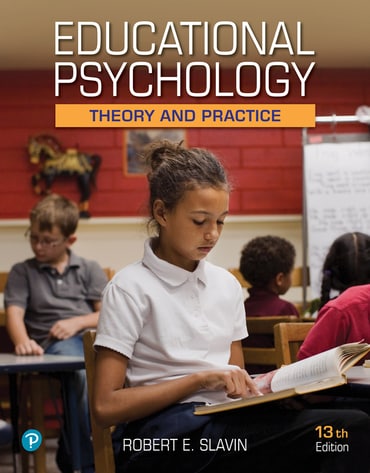
Title overview
For courses in educational psychology.
Foster the intellectual and practical strategies needed to be an effective teacher
Educational Psychology offers complete, up-to-date information that is presented in readable, practical ways and illustrated with engaging examples and case studies. The text makes an explicit connection between theory and practice, helping students transfer what they learn to their own teaching. The text has the most recent classroom-based research and includes over 2,000 citations.
The 13th Edition features a new section called “What Does the Evidence Say?” that includes recent educational research findings, as well as new and expanded coverage on topics throughout.
Hallmark features of this title
- Vignettes and Using Your Experience chapter openers provide critical- and creative-thinking questions and cooperative-learning activities.
- The Intentional Teacher features help future teachers combine the principles of educational psychology, their growing experience with learners and their creativity.
- Theory into Practice sections in each chapter present specific strategies for students to apply in the classroom.
- Certification Pointers identify content likely to be on certification tests.
- A special marginal icon identifies content that correlates to InTASC standards. These correspond closely to Praxis.
- Self-Assessment: Practicing for Licensure features at the end of each chapter are designed to resemble state certification test questions and content.
New and updated features of this title
- NEW: What Does the Evidence Say? sections in every chapter present a summary of an educational research study and its results, providing the reader with objective findings from high-quality research studies that are relevant to a topic discussed in the chapter, and helping readers understand what research is and how it contributes to knowledge about practice.
- UPDATED: The latest changes in Common Core State Standards and College- and Career-Ready Standards are incorporated throughout the text.
- UPDATED: Chapter 9, “Grouping, Differentiation, and Technology,” includes new research on tutoring by peers and teaching assistants and more on differentiated and personalized instruction.
- UPDATED: Chapter 11, “Effective Learning Environments,” includes updated research on increasing instructional time and more information on classroom management and bullying.
- UPDATED: Chapter 12, “Learners with Exceptionalities,” includes updates on special education, including learning disabilities and a new section on multi-tiered systems of support.
Table of contents
- Educational Psychology: A Foundation for Teaching
- Cognitive Development
- Social, Moral, and Emotional Development
- Student Diversity
- Behavioral and Social Theories of Learning
- Cognitive Theories of Learning
- The Direct Instruction Lesson
- Student-Centered and Constructivist Approaches to Instruction
- Grouping, Differentiation, and Technology
- Motivating Students to Learn
- Effective Learning Environments
- Learners with Exceptionalities
- Assessing Student Learning
- Standardized Tests and Accountability
Author bios
About our author
Robert Slavin is director of the Center for Research and Reform in Education, Johns Hopkins University and is a cofounder of the Success for All Foundation. He received his PhD in Social Relations from Johns Hopkins in 1975, and since that time he has authored more than 300 articles and book chapters on such topics as cooperative learning, comprehensive school reform, ability grouping, school and classroom organization, desegregation, mainstreaming, research review and evidence-based reform. Dr. Slavin is the author or coauthor of 20 books, including Cooperative Learning, School and Classroom Organization, Effective Programs for Students at Risk, Preventing Early School Failure, Show Me the Evidence: Proven and Promising Programs for Americas Schools, Two Million Children: Success for All, Effective Programs for Latino Students and Educational Research in the Age of Accountability. In 1985, Dr. Slavin received the Raymond Cattell Early Career Award for Programmatic Research from the American Educational Research Association. In 1988, he received the Palmer O. Johnson Award for the best article in an AERA journal. In 1994, he received the Charles A. Dana Award, in 1998, he received the James Bryant Conant Award from the Education Commission of the States, and in 2000, he received the Distinguished Services Award from the Council of Chief State School Officers. He again received the Palmer O. Johnson Award for the best article in an AERA journal in 2008 and received the AERA Review of Research Award in 2009. He was elected an AERA Fellow in 2010. More recently, Dr. Slavin received the E. L. Thorndike Career Achievement Award from the American Psychological Association in 2017, the Jenny Pomeroy Award for Excellence in Vision and Public Health in 2018 and the American Educational Research Associations Distinguished Contributions to Research in Education Award in 2019.